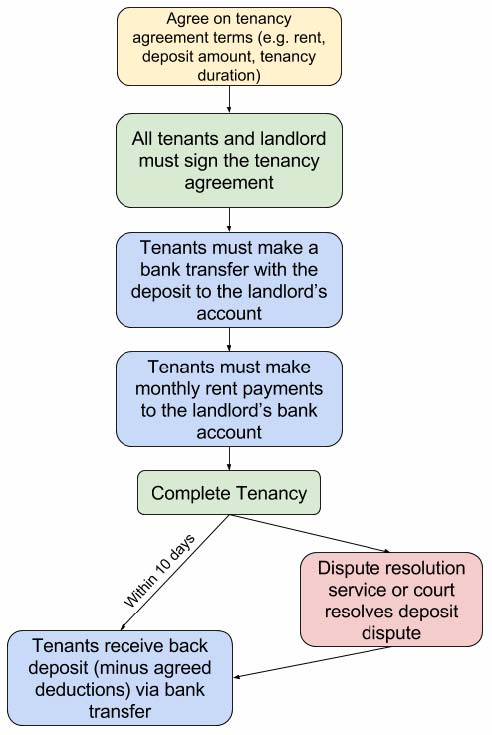We knew the day was coming when landlords and tenants would recognize the inefficiencies and unnecessary expense of renting property. We are prepared. And sales agents need not despair; They must simply reinvent themselves and sell real estate software instead. If properly done, this will be a win-win situation because that sales force comes armed with industry contacts and experience. Now they have a more palliative and more ethical product.
Smart contracts on the blockchain allow the landlord to bypass the broker and save money. He can also save on many other expenses associated with renting his property. Likewise, the tenant can have certain assurances and get faster results. Unfortunately, the middlemen such as lawyers and rental agents may lose commissions in the traditional way. However, if they are proactive they can begin to sell real estate software in the form of D-Apps and Smart contract. This is what we do with our product The Real-T.
An Overview Of Landlord-Tenant Leases
| The Real-T Smart Lease. |
In order to understand how the Real-T Smart Lease is designed let’s understand the anatomy of any standard Landlord Tenant Rental Agreement. The most common type of tenancy agreement is the ‘assured shorthold tenancy’ (AST). This agreement must be written in plain English and be of mutual benefit to both the tenant and the landlord. Differences exist between the various types of Lease deposit schemes such as insurance backed (whereby landlord keeps the deposit and pays a premium) versus custodial schemes (whereby deposit is transferred to the trusted third party scheme). There are also three government backed deposit schemes :
the Deposit Protection Service (DPS),
MyDeposits, and
the Tenancy Deposit Scheme (TDS).
The landlord must ensure that he complies with the law and puts the deposit in one of the approved escrow accounts within 30 days of receiving it . At the end of the tenancy, the deposit (minus any agreed deductions) must be returned within 10 days to the tenant , but can take longer in the case of disputes. Some of these disputes can end up in court. Handling the deposit is integrated into the smart contracts, because they provide a perfect method of holding funds without the need for a trusted third party. The main tenancy agreement stages are illustrated in the next diagram.

Issues that can arise with tenancies
| Issues that can arise with tenancies often involve the tenant failing to pay the rent. If the tenant cannot afford the rent, he can resolve the issue by giving the landlord notice to end the tenancy agreement and leave the property (generally with 2 months notice). However, this is not always the case and tenants often stay in the property without paying rent, leading to them being served an eviction notice from the real estate agent. This notice must be hand delivered or sent by recorded delivery in order to obtain a proof of delivery of the document – registered mail – (it cannot be sent by email for a number of legal reasons). |
There are also several checks that the estate agent must undertake to verify that the tenant is suitable for the tenancy and has a good record; for instance a background and credit report. They obtain an employer’s reference, a bank status inquiry (to ensure they can afford the rent), and a previous landlord reference. These help to ensure the tenant has a good record and will pay the agreed rent on time. With the current immigration headlines the tenant may in some cases nowadays be required to also have a valid passport, or a valid visa which guarantees their legal right to stay in the country for the duration of the tenancy. I believe these checks would still need to be conducted by the real estate agent to work alongside Real-T, seeing as these agents have years of experience in this field to ensure a more accurate assessment (especially as a lot of the checks carried out are done with the knowledge of what fraudulent documents look like).
Application requirements:
• The Real-T D-App is very robust as it will be handling other people’s money.
• Application does not show any users information that they are not authorized to see, due to tenancies being private matters.
• The user interface is simple to use for non-technical users.

Tenancy Agreements as Smart Contracts
Smart contracts are perfectly suited to being adapted to all kinds of contractual agreements, particularly those which involve some kind of value transfer where there are multiple, potentially distrusting, parties. As the smart contracts are independent entities which live on the decentralized blockchain whether it be the Ethereum or RSK ( formerly Rootstock ) blockchain, they can be publicly inspected, verified, and providing their logic is sound, are completely tamper-proof. Once created, the data they store is immutable, unless explicitly modified by valid transactions sent by contract participants. In the case of tenancy agreements, these transactions can map to operations such as signing the contract or transferring a rental payment. The following subsections will look at these tenancy agreement actions in more detail and will assess the possible design options.
The Real-T Smart Lease will not deal with the phase during which tenancy agreement terms such as rental amount and tenancy duration are agreed upon, since these are generally known in advance or negotiated in person prior to the contract being created. If, in the future, it was deemed necessary to add this functionality the interface would likely resemble that of the Express Agreement project detailed in another post on this website with that label. Instead, this project will handle the stages during which the tenancy agreement is actually active, from contract creation until lease completion.
Contract Creation and Signing
How does it work?
The tenancy agreement data will be stored in a smart contract which is then stored onto the blockchain in order to capitalize on the logic guarantees that smart contract code provides. This means that information such as the contract start time and duration need to be stored on-chain in order to, for example, disallow payments being made before the tenancy has started.
… To read more Register and Click on “Tenancy Smart Contract” in the Table of Contents .


